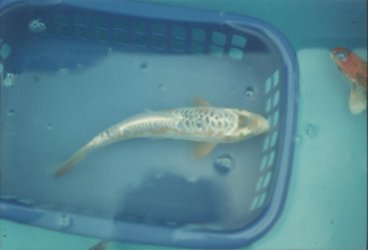elephantnose3334
Fishaholic
Are you looking forward to keep rare fish? Do you like conserving rare fish to bring back to the wild or the hobby? Then this discussion is for you.
People have kept rare fish for decades and they are still thriving today. But how about rare varieties of a certain fish, like koi guppies and giant bettas? They bred them for decades through selective breeding of generations of fish to get the variety right. They are rare in Australia, but does not mean they are rare elsewhere. The same goes for endangered fish like Boseman's Rainbowfish. Varieties are different from endangered species because varieties are colours to a certain fish, and being endangered means being threatened in the wild (loss of habitat for agriculture, for example). Some fishkeepers like conserving some species, like catching wild bettas in Thailand for conservation purposes and being released in the wild afterwards, and some varieties of koi like the Platinum Ogon koi and Ki Utsuri koi, the latter which is very rare in Australia and other states around the world, which cost a lot of money to own one.
Conservation of rare fish is even rarer in zoos and public aquaria because they think they are worthless to breed and to release in the wild. Zoos and aquaria don't care about these freshwater fish over mammals, birds and marine fish. Boseman's rainbowfish and wild bettas would be a good candidate for a rare breed of fish because they are endangered in the wild, therefore doing conservation efforts for those fish. Some species like White Cloud Mountain minnows, which are common in the hobby, but extinct in the wild, could be conserved the same way as wild bettas, but they are in captivity at first during a few months, then released in the wild in their natural habitat in China.
To conclude my conservation, I'm going to ask y'all a question to answer: Have you kept/Do you keep rare varieties of fish or an endangered fish before?
Happy fishkeeping!
People have kept rare fish for decades and they are still thriving today. But how about rare varieties of a certain fish, like koi guppies and giant bettas? They bred them for decades through selective breeding of generations of fish to get the variety right. They are rare in Australia, but does not mean they are rare elsewhere. The same goes for endangered fish like Boseman's Rainbowfish. Varieties are different from endangered species because varieties are colours to a certain fish, and being endangered means being threatened in the wild (loss of habitat for agriculture, for example). Some fishkeepers like conserving some species, like catching wild bettas in Thailand for conservation purposes and being released in the wild afterwards, and some varieties of koi like the Platinum Ogon koi and Ki Utsuri koi, the latter which is very rare in Australia and other states around the world, which cost a lot of money to own one.
Conservation of rare fish is even rarer in zoos and public aquaria because they think they are worthless to breed and to release in the wild. Zoos and aquaria don't care about these freshwater fish over mammals, birds and marine fish. Boseman's rainbowfish and wild bettas would be a good candidate for a rare breed of fish because they are endangered in the wild, therefore doing conservation efforts for those fish. Some species like White Cloud Mountain minnows, which are common in the hobby, but extinct in the wild, could be conserved the same way as wild bettas, but they are in captivity at first during a few months, then released in the wild in their natural habitat in China.
To conclude my conservation, I'm going to ask y'all a question to answer: Have you kept/Do you keep rare varieties of fish or an endangered fish before?
Happy fishkeeping!


